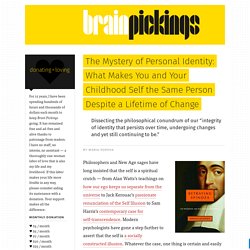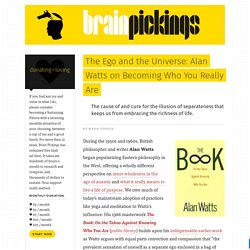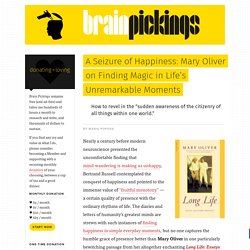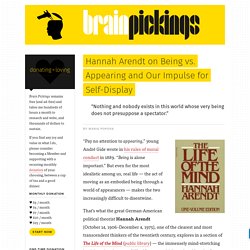

The Mystery of Personal Identity: What Makes You and Your Childhood Self the Same Person Despite a Lifetime of Change. Philosophers and New Age sages have long insisted that the self is a spiritual crutch — from Alan Watts’s teachings on how our ego keeps us separate from the universe to Jack Kerouac’s passionate renunciation of the Self Illusion to Sam Harris’s contemporary case for self-transcendence.

Modern psychologists have gone a step further to assert that the self is a socially constructed illusion. Whatever the case, one thing is certain and easily verifiable via personal hindsight — our present selves are unrecognizably different from our past selves and woefully flawed at making our future selves happy. In a remarkable passage from Betraying Spinoza: The Renegade Jew Who Gave Us Modernity (public library), her biography of the great 17th-century philosopher Baruch Spinoza, philosopher, writer, and MacArthur Fellow Rebecca Goldstein considers the perplexity of personal identity: Is death one of those adventures from which I can’t emerge as myself?
The Ego and the Universe: Alan Watts on Becoming Who You Really Are. During the 1950s and 1960s, British philosopher and writer Alan Watts began popularizing Eastern philosophy in the West, offering a wholly different perspective on inner wholeness in the age of anxiety and what it really means to live a life of purpose.

We owe much of today’s mainstream adoption of practices like yoga and meditation to Watts’s influence. His 1966 masterwork The Book: On the Taboo Against Knowing Who You Are (public library) builds upon his indispensable earlier work as Watts argues with equal parts conviction and compassion that “the prevalent sensation of oneself as a separate ego enclosed in a bag of skin is a hallucination which accords neither with Western science nor with the experimental philosophy-religions of the East.” Ikigai - Finding Your Reason for Being. When asked what is the single most powerful contributing factor to one’s health and vitality, integrative medical doctor Oscar Serrallach answered without hesitation: having a sense of purpose.

Serrallach went on to describe that while some of his patients have developed great regimes of nutrition, lifestyle activities and movement to support their wellbeing; those without a clear sense of purpose in their life experience continuing struggle with physical health issues. The distinguishing quality of many of his healthiest patients – those who transcend common health challenges despite not having lived by the book, in terms of healthy lifestyle factors – is that they seem to be the most aligned or ‘called’ towards some primary focus of meaning in their life. Japanese culture actually has a word which addresses this focus. The word is ikigai and translates simply as, ‘reason for being’. What is Your ‘Reason for Being’?
According to the Japanese, everyone has an ikigai. Follow your bliss. A Seizure of Happiness: Mary Oliver on Finding Magic in Life’s Unremarkable Moments. Nearly a century before modern neuroscience presented the uncomfortable finding that mind-wandering is making us unhappy, Bertrand Russell contemplated the conquest of happiness and pointed to the immense value of “fruitful monotony” — a certain quality of presence with the ordinary rhythms of life.

The diaries and letters of humanity’s greatest minds are strewn with such instances of finding happiness in simple everyday moments, but no one captures the humble grace of presence better than Mary Oliver in one particularly bewitching passage from her altogether enchanting Long Life: Essays and Other Writings (public library). With Thoreau’s attentiveness to the outer world and Rilke’s attentiveness to the inner, Oliver writes: On the windless days, when the maples have put forth their deep canopies, and the sky is wearing its new blue immensities, and the wind has dusted itself not an hour ago in some spicy field and hardly touches us as it passes by, what is it we do?
Hannah Arendt on Being vs. Appearing and Our Impulse for Self-Display. “Pay no attention to appearing,” young André Gide wrote in his rules of moral conduct in 1889.

“Being is alone important.” But even for the most idealistic among us, real life — the act of moving as an embodied being through a world of appearances — makes the two increasingly difficult to disentwine. That’s what the great German-American political theorist Hannah Arendt (October 14, 1906–December 4, 1975), one of the clearest and most transcendent thinkers of the twentieth century, explores in a section of The Life of the Mind (public library) — the immensely mind-stretching book based on her 1973 Gifford Lecture, which rendered her the first woman to speak at the prestigious event. The Wonderbox - How to Find Fulfilling Work. Il portale di RAI Educational dedicato alla filosofia. Diogenemagazine.